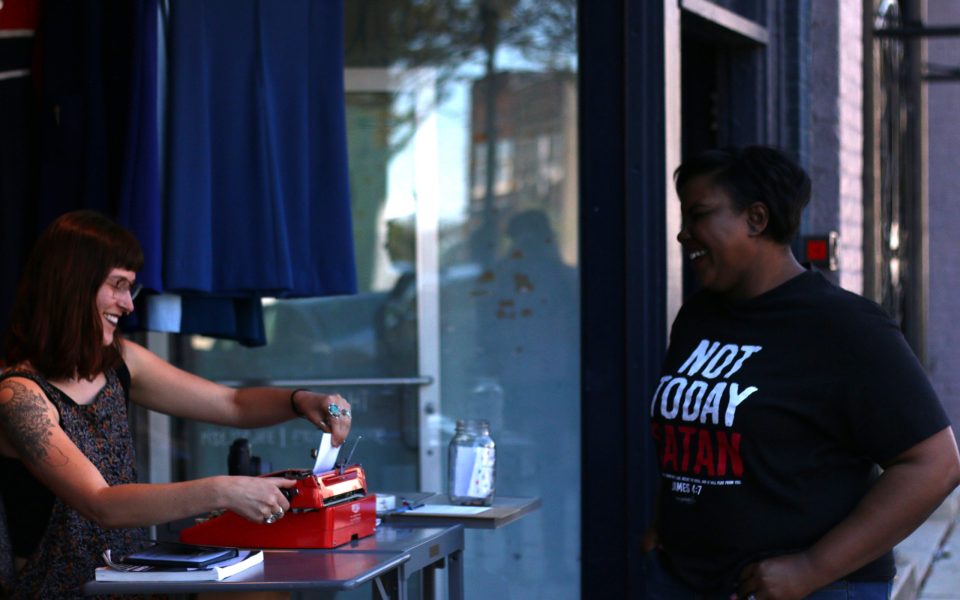Andy Jacobs sat in a red chair, at a desk that held a red typewriter. She faced the enormous window that dominates the facade of Elsewhere, a museum and artist residency in downtown Greensboro. The window was thrown open to the gorgeous spring afternoon on April 1 — a day infamous for its wisecracks and spoofs.
But there was nothing insincere in Jacobs’ odd question to those who sauntered by.
“Wanna write a postcard to the president?” she asked each one.
Jacobs, an intern at Elsewhere, held the reins of Sheryl Oring’s I Wish to Say project, a portable public office — manual typewriter in tow — that invites people to dictate postcards to the POTUS. After speaking their minds, participants were handed their statement, typed and ready to be mailed.
Oring began I Wish to Say in 2004, wanting to see what ordinary people would say to the president if given the opportunity to speak their minds. Since the project’s inception, more than 3,200 postcards have been sent to the White House. A year ago, almost 60 students from UNCG, where Oring teaches, joined her in New York City’s Bryant Park as typists, photographers and volunteers for the project’s largest public performance.
Despite whatever sentiments Oring and other typists may have toward the president — whether it be Bush, Obama, Trump or other candidates for the 2016 election — they express no opinion; they’re present only to type exactly what others wish to convey.
“I felt it was important to offer this opportunity to everyone,” Oring told Triad City Beat. “The role of listening is a crucial aspect of the work — listening to everyone, even people I disagree with personally.”
According to Oring, diversity — in more ways than presidential opinion — has been evident in I Wish to Say, both in its ambition and the reception.
“The project appeals to a broad spectrum of people from young to old and across racial and gender lines,” she explained. “People feel empowered by their participation — active listening is such a rarity these days that I think people respond to this experience.”
Jacobs, too, recognized this diversity, including one instance that highlighted the variety of age.
“There are kids that come by sometimes,” Jacobs said. “And the kids kind of surprise me by how informed they are. I had a 6-year-old boy walk up and all that he really wanted to say was: ‘That wall is a really dumb idea.’”
As Jacobs pitched the postcard to those who lumbered along Elm Street on April 1, the responses differed. Some shook their heads and moved on silently. Some laughed and tried calling her bluff, while others made their opinions known without needing a postcard.
“No,” spat one man without stopping. “I don’t want to talk to that guy.”
According to Jacobs, this frustration is common these days; more than a few finished postcards have read just: “F*** you.”
But plenty of people did pause to hear Jacobs out before dictating their own message.
Pastor Brandi Rojas, who stopped with several others on their way home from a prayer walk in downtown Greensboro, was thrilled and surprised to have the opportunity.
“Dear Mr. President,” the short message on her postcard read. “We’re praying for you. Sincerely, Brandi Rojas.”
[pullquote]Stop by Elsewhere — 606 S. Elm Street, Greensboro — every Saturday in April from 2 p.m. to 4 p.m. for the opportunity to dictate your message to the president.[/pullquote]
Oring isn’t aware of any president responding to her project, but in her view the act itself far outweighs reception at the White House.
“For me the most powerful part of the project is the moments I spend listening to each person and typing up their comments,” she said. “One person who participated during a show in Chicago came up afterwards and told me repeatedly about how participating in the project made him a better citizen. It’s comments like this that keep me going after more than 13 years of typing.”
It’s hard to imagine that the POTUS will read any of the words sent to him, much less allow the opinions to influence his decisions.
But despite the hopeless distance between the people in the United States and the ear of their president, for those passing by Elsewhere on April 1, at least one typist was listening.
Join the First Amendment Society, a membership that goes directly to funding TCB‘s newsroom.
We believe that reporting can save the world.
The TCB First Amendment Society recognizes the vital role of a free, unfettered press with a bundling of local experiences designed to build community, and unique engagements with our newsroom that will help you understand, and shape, local journalism’s critical role in uplifting the people in our cities.
All revenue goes directly into the newsroom as reporters’ salaries and freelance commissions.


Leave a Reply